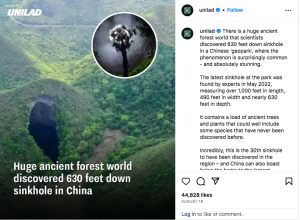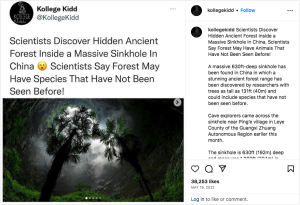
Scientists have discovered a massive ancient forest 630 feet below the surface of a sinkhole in China’s Leye-Fengshan Global Geopark.
Before you see what’s inside, you better hold on tight!
The region is home to the world’s longest natural bridge and caves, according to UNESCO. It’s located in the Guangxi Zhuang Autonomous Region of China.

“The UNESCO Global Geopark is primarily sedimentary with more than 60% of 3000m thick Devonian to Permian carbonate rocks,” according to UNESCO’s website.
“It forms an ‘S’-shaped structure and a rhombus configuration in the karst areas of Leye and Fengshan counties respectively, which controlled two large subterranean rivers’ development, the Bailang and Poyue.”
“In addition, between these two subterranean rivers the Buliuhe River was formed. Around these rivers, it formed numerous karst geosites including high karst peak clusters (fengcong), poljes, karst springs, karst windows (tiankengs), natural bridges, extensive caves, massive cave chambers and speleothems.”
“It also features fault zones, minor folds, giant panda fossils, a Neogene stratigraphic section and other fossils.
“The UNESCO Global Geopark clearly displays the developmental stages of tiankengs and high fengcong karst. It contains the world’s most beautiful karst windows, the highest density of tiankengs and largest cave chambers known in the world and the world’s longest natural bridges.”

Karst terrain is characterized by a loose soil structure that can erode from above or below the surface, creating sinkholes.
Scientists discovered a new sinkhole in the park in May 2022. It is approximately 630 feet deep, 490 feet wide, and more than 1,000 feet long.
In this sinkhole, there are many mature trees and plants. There’s a chance that some of them are new species.
The enormous space, which is 1,004 feet long and 492 feet wide, contains three cave openings that have been discovered by scientists.
“It wouldn’t surprise me if we find species in these caves that science hasn’t yet documented,” the expedition’s leader, Chen Lixin, said.
According to him, there were trees in the bush that were over 130 feet tall.
George Veni, the director of the National Cave and Karst Research Institute, was also consulted.
According to him, the karst landscape, which is composed of bedrock that is disintegrating and causing sinkholes, can vary greatly depending on the location, the temperature, and other elements.
It’s quite remarkable that this is the thirty-first known opening in the region. The largest pit in the world can be found in Xiaozhai Tiankeng, a location that makes China proud.
“In China you have this incredibly spectacular karst with enormous sinkholes and giant cave entrances and so forth.”
“In other parts of the world you walk out on the karst and you really don’t notice anything. Sinkholes might be quite subdued, only a meter or two in diameter.”
“Cave entrances might be very small, so you have to squeeze your way into them.”
Despite the fact that it appears incredible, the expert wasn’t overly surprised by the discovery. Due to its extensive karst landscape, southern China is naturally home to a large number of fascinating caves and sinkholes.
He explained that the slightly acidic rainwater in a karst environment is what erodes the rock.
Rainwater absorbs carbon dioxide from the earth as it percolates through it, increasing the acidity of the soil.
Following that, water begins to seep and flow through the bedrock’s fissures, eventually creating holes and tunnels.
A sinkhole is created when these subterranean spaces become sufficiently large for the rock above them to collapse.
It’s quite remarkable that this is the thirty-first known opening in the region. Another thing that makes China proud is Xiaozhai Tiankeng.
Other Trending Discoveries:
At 2,100 feet deep, 2,000 feet long, and 1,760 feet wide, this massive sinkhole is enormous. Its interior features a stream, giving it a Minecraft-like appearance.
Watch the video below:
Please SHARE this amazing discovery with Family and Friends
Leave a Reply